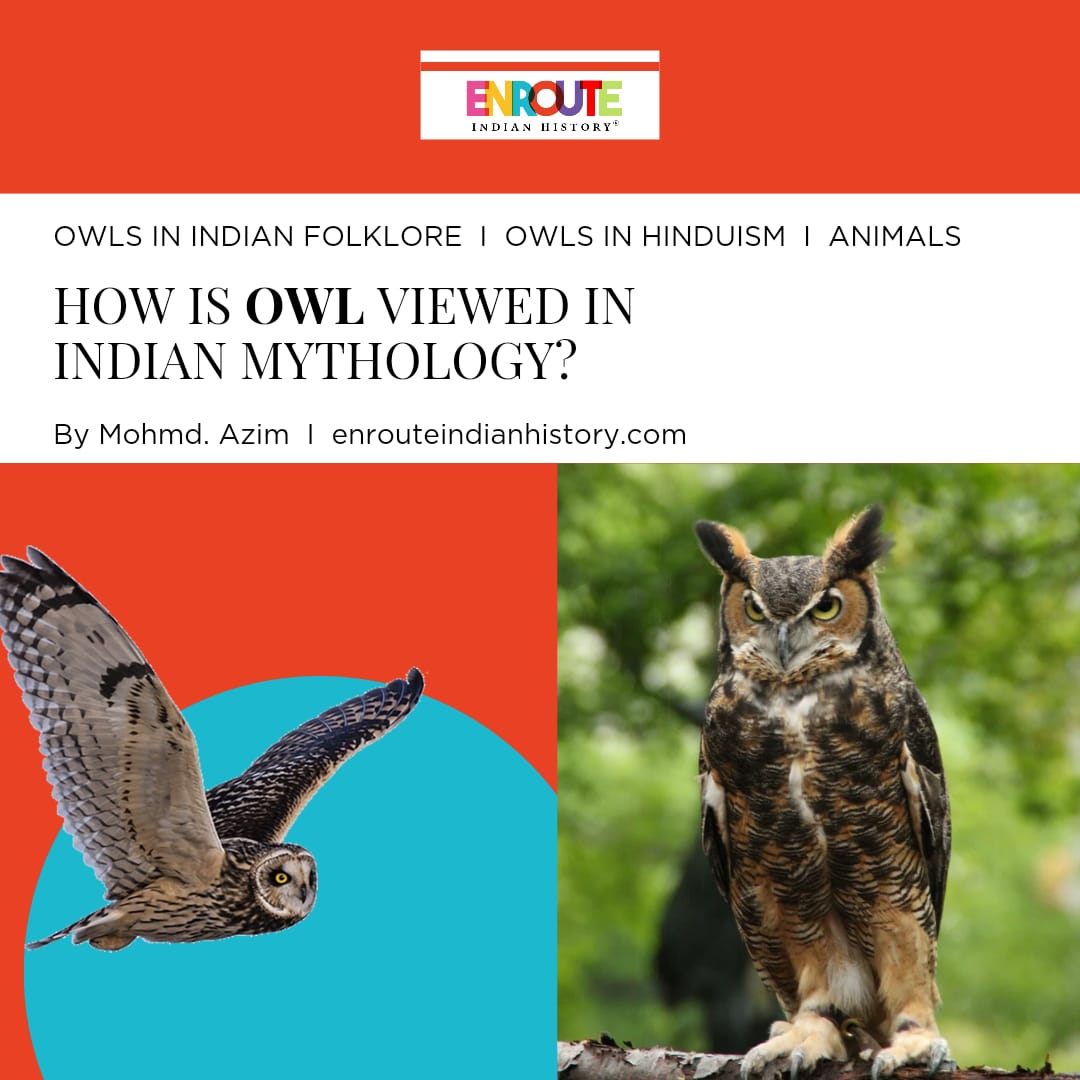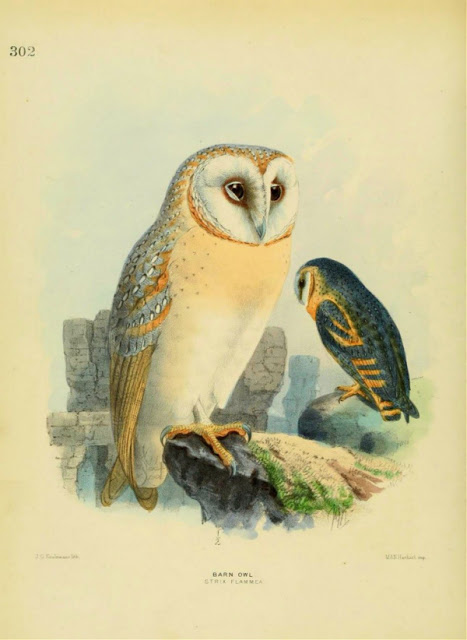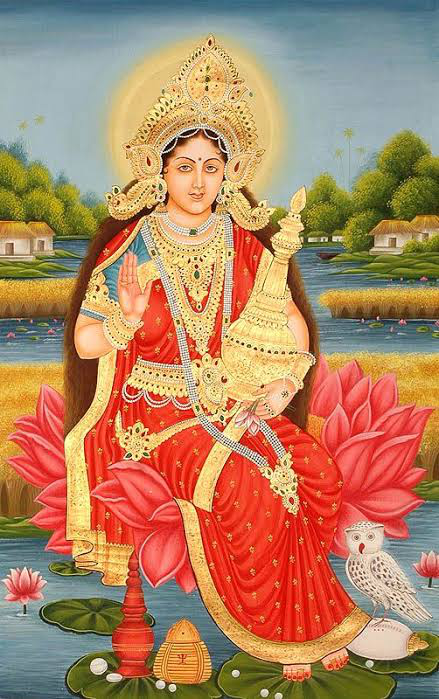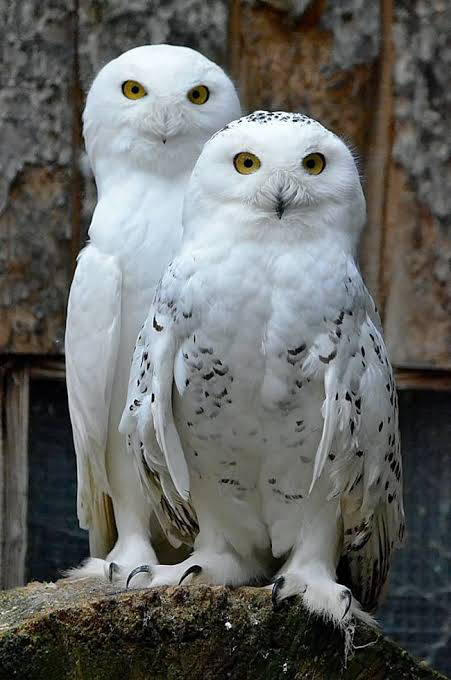
In India, owls are like mysterious characters in a story, and people see them in different ways. Some think they’re wise and smart, like symbols of good things, and even connect them to the goddess of wealth, Lakshmi. But, on the flip side, some folks feel owls bring bad luck, especially if they make noise at night. These beliefs change from place to place, with some communities seeing owls as protectors while others think they’re a bit spooky. Overall, the owl’s role in India is like a mix of good and not-so-good ideas, making it a fascinating part of the country’s cultural tale.
The Nocturnal Wisdom: Understanding the Owl in Goddess Lakshmi’s Mythology
Goddess Lakshmi, a prominent figure in Hindu mythology, is revered as the deity of wealth, fortune, and prosperity, encompassing both material and spiritual aspects. Her representation with four hands is symbolic, embodying the four fundamental goals of human life in Hindu philosophy: Dharma (righteousness and moral values), Artha (prosperity and economic values), Kama (pleasure, love, and psychological values), and Moksha (liberation and spiritual values). According to mythological accounts, Lakshmi emerged during the churning of the ocean, captivating all with her beauty, and she chose Lord Vishnu as her consort due to his pure heart.
The owl holds significance as one of the vehicles of Goddess Lakshmi, alongside other symbols such as the elephant and lotus. As a nocturnal bird, the owl’s behavior, sleeping during the day and remaining active at night, is interpreted symbolically. It is considered a representation of ignorance, prompting individuals to look beyond the superficial allure of worldly possessions and instead seek inner wisdom.

Owl in Hinduism |tamilandvedas.com
Lakshmi’s association with the owl conveys virtues of patience, intelligence, and wisdom. The symbolism encourages individuals to cultivate these qualities and move beyond mere material pursuits. The owl serves as a messenger, urging people to open their eyes to the light of wisdom residing within them.
In the broader context, Goddess Lakshmi guides individuals to embrace spiritual understanding. She prompts them to seek the blessings of Goddess Saraswathi, the deity associated with Knowledge, Wisdom, and Speech. This dual guidance underscores the interconnectedness of material and spiritual prosperity, emphasizing the importance of both inner wisdom and intellectual enlightenment on the path to a balanced and fulfilling life.

Goddess Lakshmi Watercolor Painting with Wealth Pot and Owl| exoticindiaart
In Orissa and Bengal, Lakshmi images often include a white owl, and local beliefs about its significance vary. While some suggest that Lakshmi rides the owl, others believe it simply accompanies her, with the primary mount being an elephant—a more fitting symbol for a goddess associated with wealth and power.

White Owl: Symbolize Guidance, Wisdom, and Protection |angelicalbalance
The white owl’s nocturnal nature and screeching call traditionally associate it with bad luck and death. This has led to the speculation that the owl might represent Alakshmi, Lakshmi’s elder twin associated with strife and misfortune.
Owls and Wisdom: Unraveling the Symbolic Threads
The symbolic significance of the owl as a representation of intelligence and wisdom in Indian culture is deeply ingrained in the intersection of ancient beliefs, mythological narratives, and the keen observation of the bird’s distinctive behaviors. An essential aspect of this symbolism arises from the owl’s nocturnal nature, as it remains active during the night, navigating through darkness with a heightened sense of perception. In the context of Indian cultural thought, this nocturnal behavior serves as a metaphor, symbolizing the pursuit of knowledge that transcends the obscurity of ignorance. The owl’s ability to navigate the night embodies a deeper understanding and insight sought in the quest for intellectual enlightenment.
Owls, with their mysterious and enigmatic presence, are often portrayed with large, unblinking eyes. This characteristic, shared with various cultures, including Indian, is associated with heightened perceptiveness and an unwavering focus. In Indian cultural symbolism, the owl’s distinctive features contribute to the perception of these birds as wise beings, capable of absorbing and embodying profound wisdom. The owl’s enigmatic nature further enhances its symbolic connection to intellectual enlightenment, encouraging a deeper contemplation of the mysteries of knowledge.
Additionally, the owl’s silent flight, made possible by the unique structure of its feathers, becomes a metaphor for a quiet and contemplative mind. This attribute aligns with the cultural symbolism that encourages the absorption of knowledge without unnecessary noise or disturbance. The silent flight of the owl, as perceived in Indian cultural thought, serves as a powerful symbol for the serenity and focused attention required in the pursuit of wisdom.
Owls in India: Between Superstitions and Guardianship
Owls in India carry a dual reputation shaped by a mosaic of superstitions and rituals deeply embedded in cultural beliefs. One prevailing superstition connects the hooting of owls with a morbid forecast, often interpreted as a forewarning of impending death. This association has fostered widespread apprehension and negative perceptions surrounding the sounds of owls, especially in proximity to homes. On the flip side, some communities view owls as guardians against malevolent forces, engaging in rituals that involve using owl parts as protective talismans to attract good fortune.
The symbolism of owls in India extends to construction sites, where the presence of an owl or its nest is viewed as inauspicious. Believing that such occurrences bring negative energy, these superstitions may lead to delays or even abandonment of construction projects. Additionally, the positive symbolism of owls surfaces during significant life events, such as the birth of a child. In certain communities, the sighting or sound of an owl during these times is considered auspicious and believed to bring blessings and good fortune to the newborn and their family.

Owls are Killed in Black Magic Practices
Furthermore, owls are entwined with Hindu mythology, associated with Goddess Saraswathi, the deity of knowledge, wisdom, and the arts. While some engage in rituals to appease spirits and counteract negative energy linked to owls, others associate the birds with Shani, the Hindu deity representing the planet Saturn. These diverse superstitions and rituals underscore the intricate and multifaceted relationship between owls and the cultural fabric of India, where beliefs range from fear and suspicion to reverence and protection.
Owls in India are like characters in a fascinating story, seen differently by people. Some believe they bring wisdom and good luck, especially connected to the goddess Lakshmi, while others think they bring bad luck, especially if they make noise at night. The essay explores these beliefs, from the goddess riding the owl to it being a symbol of misfortune. Additionally, it touches on how owls are linked to wisdom and knowledge, with silent flight and big eyes representing focus. The conclusion highlights the owl’s dual role, embodying both superstitions and protective symbolism, creating a rich cultural tale in India.
References :
Decor, Aksa Home. “Hindu Mythology: Connection Between Owl and Spiritual Wisdom.” Aksa Home Decor, 9 Jan. 2021, aksahomedecor.com/blogs/news/hindu-mythology-connection-between-owl-and-spiritual-wisdom.
Admin. “Why Owls Are Associated With Wealth and Wisdom in Hinduism? – Lonely Philosopher.” Lonely Philosopher, 1 Feb. 2018, www.lonelyphilosopher.com/why-owls-are-associated-with-wealth-and-wisdom-in-hinduism.
—. “The Owl in India — Facts, Stories, and Myths – Birding in India – Medium.” Medium, 1 Sept. 2018, medium.com/@birdinginindia12/the-owl-in-india-facts-stories-and-myths-c74eabec61e.
















